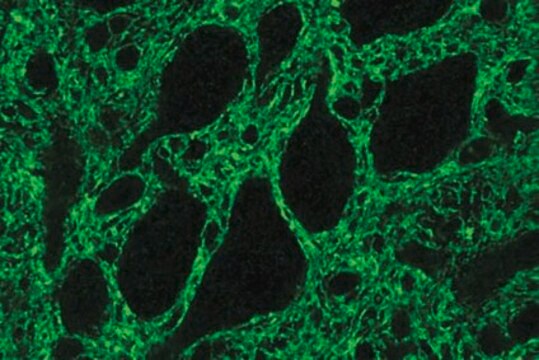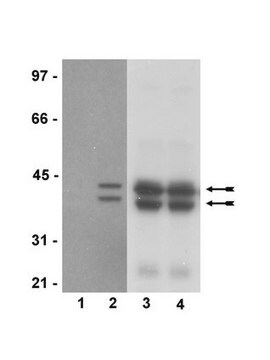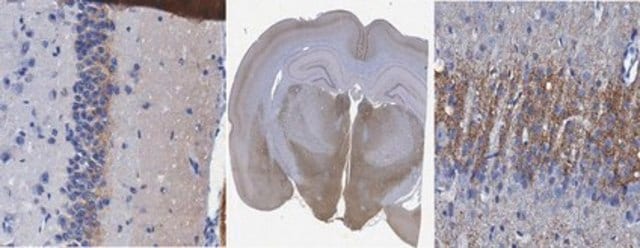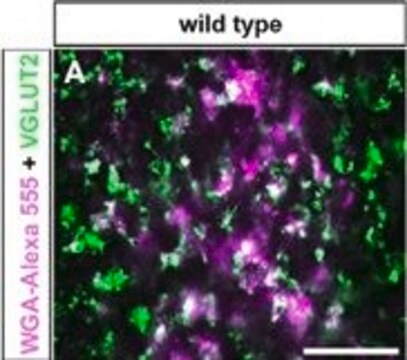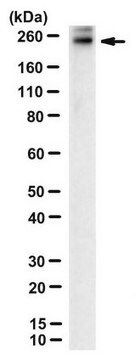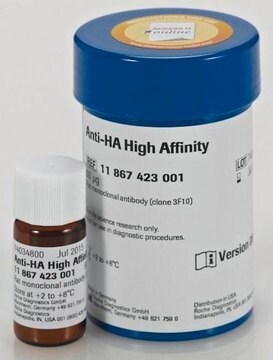MABN2439M
Anti-ABCA4 Antibody, clone 3F4
clone 3F4, from mouse
Synonyme(s) :
ABC transporter A4, RIM ABC Transporter, RIM protein
About This Item
Produits recommandés
Source biologique
mouse
Niveau de qualité
Forme d'anticorps
purified immunoglobulin
Type de produit anticorps
primary antibodies
Clone
3F4, monoclonal
Espèces réactives
bovine, human, mouse
Conditionnement
antibody small pack of 25 μg
Technique(s)
immunofluorescence: suitable
immunohistochemistry: suitable
immunoprecipitation (IP): suitable
western blot: suitable
Isotype
IgG1κ
Numéro d'accès UniProt
Modification post-traductionnelle de la cible
unmodified
Informations sur le gène
human ... ABCA4(24)
Description générale
Spécificité
Immunogène
Application
Immunofluorescence Analysis: A 1:250 dilution from a representative lot detected ABCA4 in mouse retina cells (Courtesy of Dr. Robert Molday, Ph.D., University of British Columbia, Canada).
Immunoprecipitation Analysis: A representative lot detected ABCA4 in Immunoprecipitation applications (Bungert, S., et. al. (2001). J Biol Chem. 276(26):23539-46).
Western Blotting Analysis: A representative lot detected ABCA4 in Western Blotting applications (Molday, L.L., et. al. (2000). Nat Genet. 25(3):257-8; Illing, M., et. al. (1997). J Biol Chem. 272(15):10303-10; Beharry, S., et. al. (2004). J Biol Chem. 279(52):53972-9).
Immunohistochemistry Analysis: A representative lot detected ABCA4 in Immunohistochemistry applications (Molday, L.L., et. al. (2000). Nat Genet. 25(3):257-8).
Neuroscience
Qualité
Western Blotting Analysis: 1 µg/mL of this antibody detected ABCA4 in 10 µg of human retinal tissue lysate.
Description de la cible
Forme physique
Stockage et stabilité
Autres remarques
Clause de non-responsabilité
Vous ne trouvez pas le bon produit ?
Essayez notre Outil de sélection de produits.
Code de la classe de stockage
12 - Non Combustible Liquids
Classe de danger pour l'eau (WGK)
WGK 1
Point d'éclair (°F)
Not applicable
Point d'éclair (°C)
Not applicable
Certificats d'analyse (COA)
Recherchez un Certificats d'analyse (COA) en saisissant le numéro de lot du produit. Les numéros de lot figurent sur l'étiquette du produit après les mots "Lot" ou "Batch".
Déjà en possession de ce produit ?
Retrouvez la documentation relative aux produits que vous avez récemment achetés dans la Bibliothèque de documents.
Notre équipe de scientifiques dispose d'une expérience dans tous les secteurs de la recherche, notamment en sciences de la vie, science des matériaux, synthèse chimique, chromatographie, analyse et dans de nombreux autres domaines..
Contacter notre Service technique
